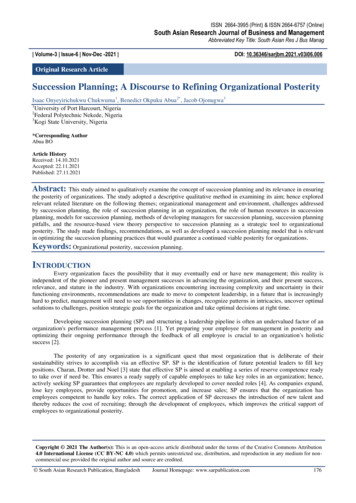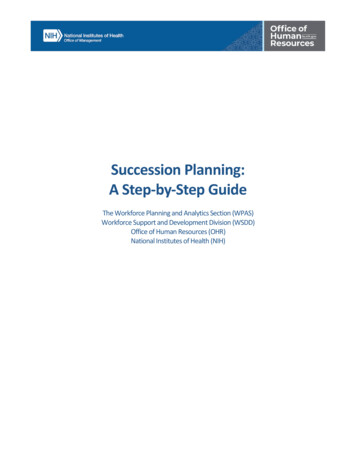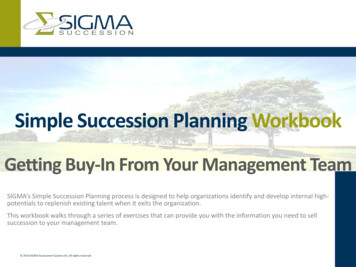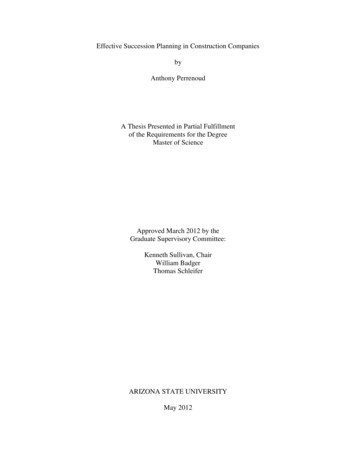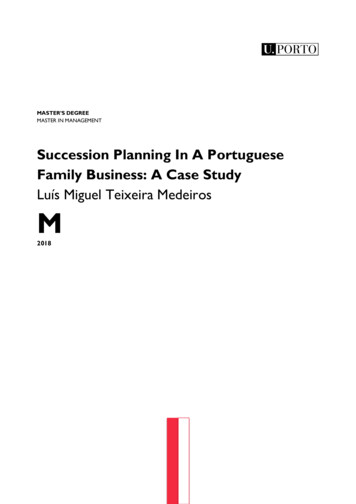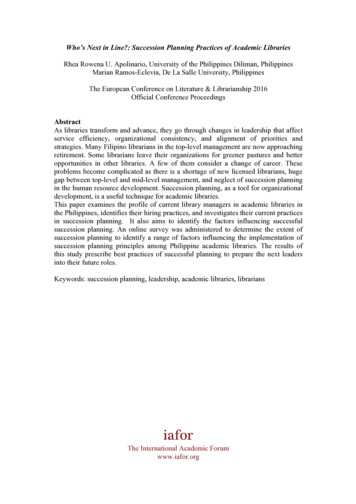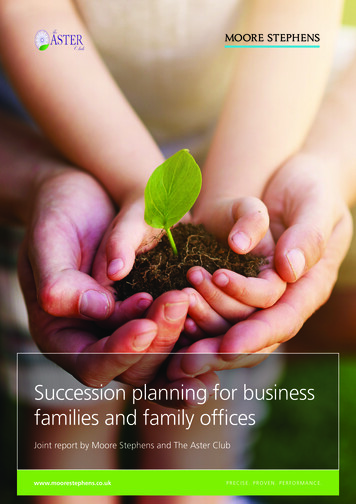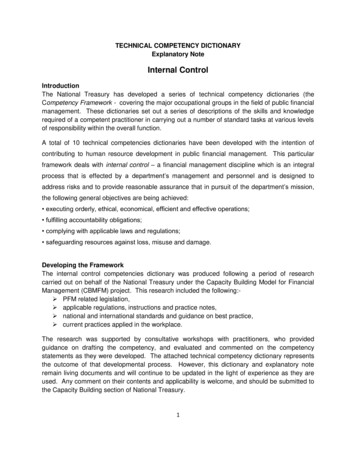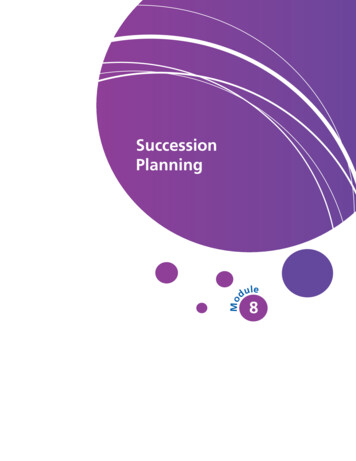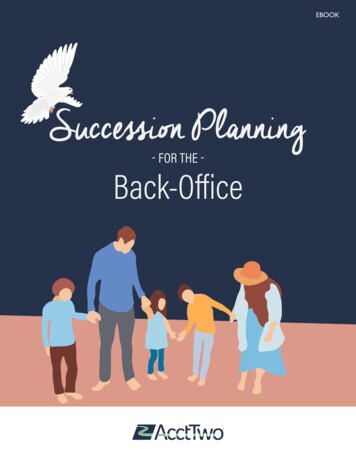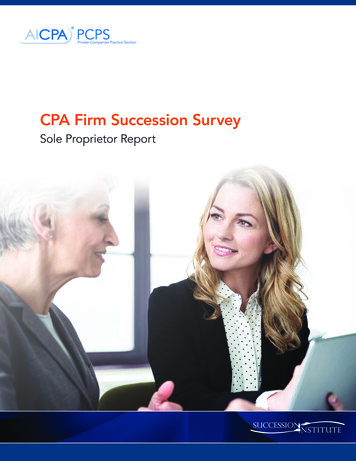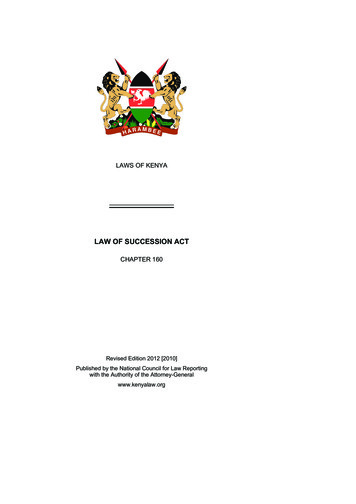
Transcription
LAWS OF KENYALAW OF SUCCESSION ACTCHAPTER 160Revised Edition 2012 [2010]Published by the National Council for Law Reportingwith the Authority of the Attorney-Generalwww.kenyalaw.org
[Rev. 2012]CAP. 160Law of SuccessionCHAPTER 160LAW OF SUCCESSION ACTARRANGEMENT OF SECTIONSPART I – PRELIMINARYSection1.2.3.4.Short title.Application of Act.Interpretation.Law applicable to succession.PART II – WILLSCapacity5.6.7.Persons capable of making wills and freedom of testation.Appointment by will or executor.Wills caused by fraud, coercion importunity or mistake.Formalities8.9.10.11.12.13.14.15.16.Form of wills.Oral wills.Proof of oral wills.Written wills.Incorporation of papers by reference.Effect of gift to attesting witness.Witness not disqualified by being executor.Existing wills.Formal validity of other wills.17.18.19.20.21.Will may be revoked or altered.Revocation of will.Revocation of will by testator’s marriage.Effect of obliteration, interlineation or alteration in will.Revival of will.22.Construction of wills.23.Failure of testamentary dispositions.24.Election.25.Repealed.Revocation, Alteration and RevivalConstructionFailure of DispositionsElectionPerpetuities, Remoteness and Accumulations3[Issue 1]
CAP. 160[Rev. 2012]Law of SuccessionPART III – PROVISIONS FOR DEPENDANTSSection26.27.28.29.30.Provisions for dependants not adequately provided for by will or on intestacy.Discretion of court in making order.Circumstances to be taken into account by court in making order.Meaning of dependant.Limitation of time.PART IV – GIFTS IN CONTEMPLATION OF DEATH31.Characteristics.PART V – INTESTACY32.33.34.35.36.37.38.39.40.41.42.Excluded property.Law applicable to excluded property.Meaning of intestacy.Where intestate has left one surviving spouse and child or children.Where intestate has left one surviving spouse but no child or children.Powers of spouse during life interest.Where intestate has left a surviving child or children but no spouse.Where intestate has left no surviving spouse or children.Where intestate was polygamous.Property devolving upon child to be held in trust.Previous benefits to be brought into account.43.Presumption of survivorship.44.Application of Part.45.46.No intermeddling with property of deceased person.Duties of officers in relation to protection, etc. of deceased’s property.47.48.49.50.50A.Jurisdiction of High Court.Jurisdiction of magistrates.Territorial jurisdiction of magistrates.Appeals to High Court.Power to make rules.51.52.Application for grant.Wilful and reckless statements in application for grant.53.54.55.Forms of grant.Limited grants.No distribution of capital before confirmation of grant.PART VI – SURVIVORSHIPPART VII – ADMINISTRATION OF ESTATESProtectionJurisdictionApplication for GrantForms and Grants[Issue 1]4
[Rev. 2012]CAP. 160Law of SuccessionPersons Entitled to a GrantSection56.57.58.59.60.61.62.63.64.65.66.No grant to certain persons.Grant to body corporate.Number of administrators where there is a continuing trust.Renunciation of executorship.Probate where there are several executors.Discovery of codicil after grant of probate.No grant of administration until citation issued to executor.Grant of administration to universal or residuary legatee.Right to administration of representative of deceased residuary legatee.Grant of administration where no executor nor residuary legatee nor representativeof legatee.Preference to be given to certain persons to administer where deceased diedintestate.Procedure on Grants67.68.69.70.Notice of application for grant.Objections to application.Procedure after notice and objections.Powers of courts.71.72.73.Confirmation of grants.Grants not to be confirmed in certain circumstances.Duty of court to give notice to holder of grant to apply for confirmation.Confirmation of GrantsAlteration and Revocation of Grants74.75.75A.76.Errors may be rectified by court.Procedure where codicil discovered after grant.Continuing trust arising.Revocation or annulment of grant.77.78.Sealing of Commonwealth and foreign grants.Duplicate or copy of foreign grant to have same effect as original.79.80.81.Property of deceased to vest in personal representative.When grant takes effect.Powers and duties of personal representatives to vest in survivor on death of oneof them.Powers of personal representatives.Duties of personal representatives.Personal representatives to act as trustees in certain cases.Assent necessary to complete legatee’s title.Debts to be paid before legacies.Personal representatives not bound to pay legacies without indemnity.Sealing of Commonwealth and Foreign GrantsPowers and Duties of Personal Representatives82.83.84.85.86.87.5[Issue 1]
CAP. 160[Rev. 2012]Law of SuccessionSection88.89.90.91.92.93.94.95.Abatement and refunding of legacies.Insolvent estates.Investment of funds to provide for legacies and interest on legacies.Transfer of assets from Kenya to personal representatives in country of domicile fordistribution.Protection of persons acting on representation.Validity of transfer not affected by revocation of representation.Neglect or misapplication of assets by personal representatives.Offences by personal representatives.PART VIII – MISCELLANEOUS96.97.98.99.100.101.Sane murderer not to share in victim’s .SCHEDULESFIRST SCHEDULE–CONSTRUCTION OF WILLSSECOND SCHEDULE–FAILURE OF TESTAMENTARY DISPOSITIONSTHIRD SCHEDULE–ELECTIONFOURTH SCHEDULEDELETEDFIFTH SCHEDULE–FORMS OF LIMITED GRANTSIXTH SCHEDULE–ABATEMENT AND REFUNDING OF LEGACIESSEVENTH SCHEDULE –INVESTMENT OF FUNDS TO PROVIDE FORLEGACIES AND INTEREST ON LEGACIESEIGHTH SCHEDULE–LAWS REPEALEDNINTH SCHEDULE–LAWS AMENDED[Issue 1]6
[Rev. 2012]CAP. 160Law of SuccessionCHAPTER 160LAW OF SUCCESSION ACT[Date of assent: 13th November, 1972.][Date of commencement: 1st July, 1981.]An Act of Parliament to amend, define and consolidate the law relating tointestate and testamentary succession and the administration of estatesof deceased persons; and for purposes connected therewith andincidental thereto[Act No. 7 of 1975, Act No. 8 of 1976,L.N. 256/1976, Act No. 16 of 1977, Act No. 13 of 1978,Act No. 10 of 1981, L.N. 93/1981, Act No. 6 of 1984; Act No. 19 of 1984, Act No. 18 of 1986,Act No. 21 of 1990.]PART I – PRELIMINARY1. Short titleThis Act may be cited as the Law of Succession Act.2. Application of Act(1) Except as otherwise expressly provided in this Act or any other writtenlaw, the provisions of this Act shall constitute the law of Kenya in respect of, andshall have universal application to, all cases of intestate or testamentarysuccession to the estates of deceased persons dying after, the commencementof this Act and to the administration of estates of those persons.(2) The estates of persons dying before the commencement of this Act aresubject to the written laws and customs applying at the date of death, butnevertheless the administration of their estates shall commence or proceed sofar as possible in accordance with this Act.(3) Subject to subsection (4), the provision of this Act shall not apply totestamentary or intestate succession to the estate of any person who at the timeof his death is a Muslim to the intent that in lieu of such provisions the devolutionof the estate of any such person shall be governed by Muslim law.(4) Notwithstanding the provisions of subsection (3), the provisions of Part VIIrelating to the administration of estates shall where they are not inconsistent withthose of Muslim law apply in case of every Muslim dying before, on or after the1st January, 1991.[Act No. 16 of 1977, Sch., Act No. 13 of 1978, Sch., Act No. 21 of 1990, Sch.]3. Interpretation(1) In this Act, except where the context otherwise requires—“active service” means service with the armed forces or merchant marineon a field of military operations or at sea, or proceeding to or from or suchfield or sea, or under orders to proceed to such field or sea, or in being insome place for the purpose of proceeding to such field or sea;7[Issue 1]
CAP. 160[Rev. 2012]Law of Succession“administrator” means a person to whom a grant of letters ofadministration has been made under this Act;“agricultural land” means land used for agricultural purposes which isnot within a municipality or a township or a market but does not include landregistered under the provisions of any written law;“authorized investment”, with reference to the investment of any fund,means an investment of such type as is authorized for investment of that fundby any will applying thereto, or as is for the time being authorized by anywritten law for the investment of trust funds;“charitable purpose” includes the relief of poverty, the advancement ofeducation, the advancement of religion, and any other purpose of a publicnature and capable of administration by a court of law which benefits thecommunity at large or the inhabitants or a particular class of inhabitants of aparticular locality;“codicil” means a testamentary instrument made in relation to a will,explaining, altering or adding to its dispositions or appointments, and dulymade and executed as required by the provisions of this Act for the makingand execution of a will;“competent witness” means a person of sound mind and full age;“court” means a court having jurisdiction under this Act in the matter inquestion;“demonstrative legacy” means a testamentary gift which is in its naturegeneral but which manifests an intention that the gift shall be primarilysatisfied out of a specified fund or a specified part of the property of thetestator, but shall, upon failure of that fund or property, be met from thegeneral estate;“estate” means the free property of a deceased person;“executor” means a person to whom the execution of the last will of adeceased person is, by the testator’s appointment, confided;“free property”, in relation to a deceased person, means the property ofwhich that person was legally competent freely to dispose during his lifetime,and in respect of which his interest has not been terminated by his death;“full age” means having attained the age of eighteen years;“general legacy” means a testamentary gift, whether specific or general,of property described in general terms to be provided out of the general estateof the testator, whether or not also charged on any specific part of his estate;“general power of appointment” means an unfettered power ofappointment to such object or objects as the appointer may think fit;“general residuary bequest” means a testamentary gift of all theproperty of the testator not otherwise disposed of;“house” means a family unit comprising a wife, whether alive or dead atthe date of the death of the husband, and the children of that wife;“income” includes rents and profits;[Issue 1]8
[Rev. 2012]CAP. 160Law of Succession“independent witness” means a witness who is not a beneficiary under awill or the spouse of any such beneficiary;“limited residuary bequest” means a testamentary gift which, but forsome specific limitation therein expressed or implied, would constitute ageneral residuary bequest;“minor” means any person who is not of full age;“Muslim” means any person who professes the religion of Islam andaccept the unity of God and Mohammed as his prophet;“Muslim law” means the law applicable to a person who is a Muslim atthe time of his death;“net estate” means the estate of a deceased person after payment ofreasonable funeral expenses, debts and liabilities, expenses of obtainingprobate or letters of administration, other reasonable expenses ofadministration and estate duty, if any;“net intestate estate” means the estate of a deceased person in respectof which he has died intestate after payment of the expenses, debts, liabilitiesand estate duty set out under the definition of “net estate”, so far as theexpenses, debts, liabilities and estate duty are chargeable against that estate;“particular residual bequest” means a testamentary gift of all of aparticular property not otherwise disposed of;“pecuniary legacy” includes an annuity, a general legacy, ademonstrative legacy so far as it is not discharged out of the specified fund orproperty, and any other general direction by the testator for the payment ofmoney, including all death duties free from which any gift is made to takeeffect;“personal and household effects” means clothing and articles ofpersonal use and adornment, furniture, appliances, pictures, ornaments, food,drink, utensils and all other articles of household use or decoration normally tobe associated with a matrimonial home, but does not include any motorvehicle or any other thing connected with the business or profession of thedeceased;“personal representative” means the executor or administrator, as thecase may be, of a deceased person;“portion” means provision by a parent or person in loco parentis toestablish a child in life;“power of appointment” means power vested in some person todetermine the disposition of property of which that person is not the owner;“probate” means the certificate of a court of competent jurisdiction, that awill, of which a certified copy is attached in the case of a written will, has beenproved a valid will, with a grant of representation to the executor in respect ofthe estate;“purchaser” means a purchaser for money or money’s worth;“representation” means the probate of a will or the grant of letters ofadministration;9[Issue 1]
CAP. 160[Rev. 2012]Law of Succession“special legacy” means a testamentary gift of a particular part of theproperty of the testator, which identifies that part by a sufficient description,whether in specific or in general terms, and manifests an intention that thatpart shall be enjoyed or taken in the state and condition indicated by thatdescription;“special power of appointment” means power of appointment to suchobject or objects within a special description or class as the appointer maythink fit;“trust corporation” means an incorporated banking or insurance orguarantee or trust company having a subscribed capital of not less than fivehundred thousand shillings, or any body corporate which has a subscribedcapital of not less than five hundred thousand shillings and which is for thetime being empowered (by or under any written law, its charter, memorandumof association, deed of settlement or other instrument constituting it ordefining its powers), to undertake trusts, but for so long a time only as thatbody corporate shall not, by any prospectus, circular, advertisement or otherdocument issued by it or on its behalf, state or hold out that any liabilityattaches to the Public Trustee or to the Consolidated Fund in respect of anyact or omission of that body corporate when acting as an executor oradministrator:Provided that a body corporate which would be a trust corporation butfor the fact that its subscribed capital is less than five hundred thousandshillings may act as executor or administrator in any case with the leave of thecourt on giving such security as the court may determine, and thereupon forthe purpose of so acting as executor or administrator that corporation shallhave all the rights and privileges conferred on a trust corporation by this Act;“wife” includes a wife who is separated from her husband and the terms“husband” and “spouse”, “widow” and widower” shall have a correspondingmeaning;“will” means the legal declaration by a person of his wishes or intentionsregarding the disposition of his property after his death, duly made andexecuted according to the provisions of Part II, and includes a codicil.(2) References in this Act to “child” or “children” shall include a childconceived but not yet born (as long as that child is subsequently born alive) and,in relation to a female person, any child born to her out of wedlock, and, inrelation to a male person, any child whom he has expressly recognized or in factaccepted as a child of his own or for whom he has voluntarily assumedpermanent responsibility.(3) A child born to a female person out of wedlock, and a child as defined bysubsection (2) as the child of a male person, shall have relationship to otherpersons through her or him as though the child had been born to her or him inwedlock.(4) Where the date of birth of any person is unknown or cannot beascertained, that person shall be treated as being of full age for the purposes ofthis Act if he has apparently attained the age of eighteen years, and shall nototherwise be so treated.[Issue 1]10
[Rev. 2012]CAP. 160Law of Succession(5) Notwithstanding the provisions of any other written law, a woman marriedunder a system of law which permits polygamy is, where her husband hascontracted a previous or subsequent monogamous marriage to another woman,nevertheless a wife for the purposes of this Act, and in particular sections 29 and40 thereof, and her children are accordingly children within the meaning of thisAct.[Act No. 8 of 1976, s. 2, Act No. 10 of 1981, Sch., Act No. 21 of 1990, Sch.]4. Law applicable to succession(1) Except as otherwise expressly provided in this Act or by any other writtenlaw—(a)succession to immovable property in Kenya of a deceased personshall be regulated by the law of Kenya, whatever the domicile of thatperson at the time of his death;(b)succession to the movable property of a deceased person shall beregulated by the law of the country of the domicile of that person atthe time of his death.(2) A person who immediately before his death was ordinarily resident inKenya shall, in the absence of proof of domicile elsewhere, be presumed to havebeen domiciled in Kenya at the date of death.PART II – WILLSCapacity5. Persons capable of making wills and freedom of testation(1) Subject to the provisions of this Part and Part III, every person who is ofsound mind and not a minor may dispose of all or any of his free property by will,and may thereby make any disposition by reference to any secular or religiouslaw that he chooses.(2) A female person, whether married or unmarried, has the same capacity tomake a will as does a male person.(3) Any person making or purporting to make a will shall be deemed to be ofsound mind for the purpose of this section unless he is at the time of executingthe will, in such a state of mind, whether arising from mental or physical illness,drunkenness, or from any other cause, as not to know what he is doing.(4) The burden of proof that a testator was, at the time he made any will, notof sound mind, shall be upon the person who so alleges.[Act No. 8 of 1976, s. 3.]6. Appointment by will or executorA person may, by will, appoint an executor or executors.7. Wills caused by fraud, coercion, importunity or mistakeA will or any part of a will, the making of which has been caused by fraud orcoercion, or by such importunity as takes away the free agency of the testator, orhas been induced by mistake, is void.11[Issue 1]
CAP. 160[Rev. 2012]Law of SuccessionFormalities8. Form of willsA will may be made either orally or in writing.9. Oral wills(1) No oral will shall be valid unless—(a)it is made before two or more competent witnesses; and(b)the testator dies within a period of three months from the date ofmaking the will:Provided that an oral will made by a member of the armed forces ormerchant marine during a period of active service shall be valid if the testatordies during the same period of active service notwithstanding the fact that hedied more than three months after the date of making the will.(2) No oral will shall be valid if, and so far as, it is contrary to any written willwhich the testator has made, whether before or after the date of the oral will, andwhich has not been revoked as provided by sections 18 and 19.10. Proof of oral willsIf there is any conflict in evidence of witnesses as to what was said by thedeceased in making an oral will, the oral will shall not be valid except so far as itscontents are proved by a competent independent witness.[Act No. 13 of 1978, Sch.]11. Written willsNo written will shall be valid unless—(a)the testator has signed or affixed his mark to the will, or it has beensigned by some other person in the presence and by the direction ofthe testator;(b)the signature or mark of the testator, or the signature of the personsigning for him, is so placed that it shall appear that it was intendedthereby to give effect to the writing as a will;(c)the will is attested by two or more competent witnesses, each ofwhom must have seen the testator sign or affix his mark to the will,or have seen some other person sign the will, in the presence andby the direction of the testator, or have received from the testator apersonal acknowledgement of his signature or mark, or of thesignature of that other person; and each of the witnesses must signthe will in the presence of the testator, but it shall not be necessarythat more than one witness be present at the same time, and noparticular form of attestation shall be necessary.12. Incorporation of papers by referenceIf a testator, in a will or codicil, refers to another document then actuallywritten, and expressing any part of his intentions, that document, where it isclearly identified as the document to which the will refers, shall be considered asforming part of the will or codicil in which it is referred to.[Issue 1]12
[Rev. 2012]CAP. 160Law of Succession13. Effect of gift to attesting witness(1) A will shall not be considered as insufficiently attested by reason of anybenefit thereby given, either by way of bequest or by way of appointment to anyperson attesting it, or to his or her spouse.(2) A bequest to an attesting witness (including any direction as to paymentof costs or charges) or a bequest to his or her spouse shall be void, unless thewill is also attested by at least two additional competent and independentwitnesses, in which case the bequest shall be valid.[Act No. 8 of 1976, s. 4.]14. Witness not disqualified by being executorNo person, by reason of his being an executor of a will, shall be disqualifiedas a witness to prove the execution of the will or to prove the validity or invaliditythereof.15. Existing willsNotwithstanding the provisions of this Part, any written will executed beforethe commencement of this Act shall, whether the testator dies before or after thecommencement of this Act, be treated as properly executed if it was executedaccording to the requirements of the law in force at the date of execution.16. Formal validity of other willsNotwithstanding the provisions of this Part, every will, whether of movable orimmovable property, and whether executed before or after the commencement ofthis Act, shall be treated as properly executed if its execution conformed, eitherat the time of execution or at the time of the testator’s death, to the law in force—(a)in the state where it was executed; or(b)in the state where the property is situated; or(c)in the state where, at the time of its execution or the testator’s death,he was domiciled; or(d)in a state of which the testator was a national either at the time of itsexecution or on his death.Revocation, Alteration and Revival17. Will may be revoked or alteredA will may be revoked or altered by the maker of it at any time when he iscompetent to dispose of his free property by will.18. Revocation of will(1) Save as provided by section 19, no will or codicil, or any part thereof, shallbe revoked otherwise than by another will or codicil declaring an intention torevoke it, or by the burning, tearing or otherwise destroying of the will with theintention of revoking it by the testator, or by some other person at his direction.(2) A written will shall not be revoked by an oral will.13[Issue 1]
CAP. 160[Rev. 2012]Law of Succession19. Revocation of will by testator’s marriageA will shall be revoked by the marriage of the maker; but where a willexpressed to be made in contemplation of marriage with a specified person, itshall not be revoked by the marriage so contemplated.20. Effect of obliteration, interlineation or alteration in will(1) No obliteration, interlineation or other alteration made in a written will afterthe execution thereof shall have any effect unless the alteration is signed andattested as a written will is required to be under section 11:Provided that a will as so altered shall be deemed to be duly executed if thesignature of the testator and the subscription of the witnesses is made in themargin or on some other part of the will opposite or near to the alteration, or isreferred to in a memorandum written at the end or some other part of the will andso signed and attested.(2) Where a typewritten or printed will purports to have been executed by thefilling in of any blank spaces, there shall be a presumption that the will has beenduly executed.21. Revival of will(1) No will which has been in any manner wholly revoked shall be revivedotherwise than by the re-execution thereof.(2) Where only part of a will has been revoked that part shall not be revivedotherwise than by the re-execution thereof or by a subsequent will or codicilshowing an intention to revive it.Construction22. Construction of willsWills shall be construed in accordance with the provisions of the FirstSchedule to this Act.Failure of Dispositions23. Failure of testamentary dispositionsTestamentary gifts and dispositions shall fail by way of lapse or ademption inthe circumstances and manner and to the extent provided by the SecondSchedule.Election24. ElectionBeneficiaries under testamentary gifts or dispositions shall be put to electionin the circumstances and manner and to the extent provided by the ThirdSchedule.Perpetuities, Remoteness and Accumulations25. Repealed by Act No. 6 of 1984, Sch.[Issue 1]14
[Rev. 2012]CAP. 160Law of SuccessionPART III – PROVISIONS FOR DEPENDANTS26. Provisions for dependants not adequately provided for by will or onintestacyWhere a person dies after the commencement of this Act, and so far assuccession to his property is governed by the provisions of this Act, then on theapplication by or on behalf of a dependant, the court may, if it is of the opinionthat the disposition of the deceased’s estate effected by his will, or by gift incontemplation of death, or the law relating to intestacy, or the combination of thewill, gift and law, is not such as to make reasonable provision for that dependant,order that such reasonable provision as the court thinks fit shall be made for thatdependant out of the deceased’s net estate.[Act No. 8 of 1976, s. 5.]27. Discretion of court in making orderIn making provision for a dependant the court shall have complete discretionto order a specific share of the estate to be given to the dependant, or to makesuch other provision for him by way of periodical payments or a lump sum, and toimpose such conditions, as it thinks fit.28. Circumstances to be taken into account by court in making orderIn considering whether any order should be made under this Part, and if sowhat order, the court shall have regard to—(a)the nature and amount of the deceased’s property;(b)any past, present or future capital or income from any source of thedefendant;(c)the existing and future means and needs of the dependant;(d)whether the deceased had made any advancement or other gift tothe dependant during his lifetime;(e)the conduct of the dependant in relation to the deceased;(f)the situation and circumstances of the deceased’s other dependantsand the beneficiaries under any will;(g)the general circumstances of the case, including, so far as can beascertained, the testator’s reasons for not making provision for thedependant.[L.N. 256/1976.]29. Meaning of dependantFor the purposes of this Part, “dependant” means—(a)the wife or wives, or former wife or wives, and the children of thedeceased whether or not maintained by the deceased immediatelyprior to his death;(b)such of the deceased’s parents, step-parents, grand-parents,grandchildren, step-children, children whom the deceased had takeninto his family as his own, brothers and sisters, and half-brothersand half-sisters, as were being maintained by the deceasedimmediately prior to his death; and15[Issue 1]
CAP. 160[Rev. 2012]Law of Succession(c)where the deceased was a woman, her husband if he was beingmaintained by her immediately prior to the date of her death.30. Limitation of timeNo application under this Part shall be brought after a grant of representationin respect of the estate to which the application refers has been confirmed asprovided by section 71.PART IV – GIFTS IN CONTEMPLATION OF DEATH31. CharacteristicsA gift made in contemplation of death shall be valid, notwithstanding that therehas been no complete transfer of legal title, if—(a)the person making the gift is at the time contemplating the possibilityof death, whether or not expecting death, as the result of a presentillness or present or imminent danger; and(b)a person gives movable property (which includes any debt securedupon movable or immovable property) which he could otherwisedispose of by will; and(c)there is delivery to the intended beneficiary of possession or themeans of possession of the property or of the documents or otherevidence of title thereto; and(d)a person makes a gift in such circumstances as to show that heintended it to revert to him should he survive that illness or danger; and(e)the person making that gift dies from any cause without havingsurvived that same illness or danger; and(f)the intended beneficiary survives the person who made the gift tohim:Provided that—(i) no gift made in contemplation of death shall be valid if thedeath is caused by suicide;(ii) the person making the gift may, at any time before his death,lawfully request its return.PART V – INTESTACY32. Excluded propertyThe provisions of this Part shall not apply to—(a)agricultural land and crops thereon; or(b)livestock,in various Districts set out in the Schedule:West PokotTurkanaMarsabitManderaWajirG
PART II - WILLS Capacity 5. Persons capable of making wills and freedom of testation. 6. Appointment by will or executor. 7. Wills caused by fraud, coercion importunity or mistake. Formalities 8. Form of wills. 9. Oral wills. 10. Proof of oral wills. 11. Written wills. 12. Incorporation of papers by reference. 13. Effect of gift to attesting .
